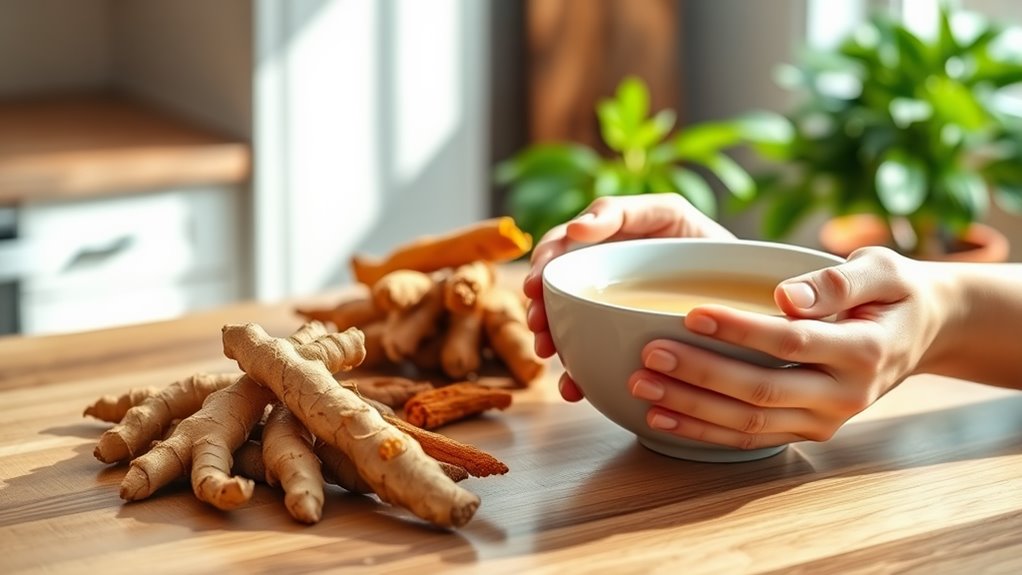Stop Kidney Pain Instantly With This Simple Household Trick!
To stop kidney pain instantly, try using a heat pad on your lower back. The warmth soothes discomfort and relaxes tense muscles. Don’t forget to hydrate; drink plenty of water and consider adding lemon juice for extra benefits. Herbal remedies like ginger tea can also help reduce inflammation. For even more relief strategies and insights on kidney health, keep exploring more tips that can make a significant difference in how you feel.
Understanding Kidney Pain: Causes and Symptoms
When you experience kidney pain, it’s essential to understand its underlying causes and symptoms. This discomfort can stem from various issues, including kidney stones, infections, or even dehydration. Recognizing these causes helps you pinpoint the right approach for relief.
Symptoms often include sharp pain in your lower back or sides, blood in urine, or frequent urination. If you find yourself in acute distress, a kidney pain quick fix may involve hydration and over-the-counter pain relievers.
However, it’s crucial to consult with a healthcare professional for a proper diagnosis and treatment plan. By mastering this knowledge, you’ll empower yourself to address kidney pain effectively and prevent future occurrences.
Essential Household Items for Relief
Finding relief from kidney pain can often be achieved with items you already have at home. Heat pads are excellent for soothing discomfort; place one on your lower back for immediate warmth.
Ginger tea is another powerful ally; its anti-inflammatory properties can help reduce pain and promote kidney health. You can also use apple cider vinegar; mixing a couple of tablespoons in water may help dissolve kidney stones and ease pain.
Additionally, fresh lemon juice in water can aid in flushing out toxins. If you have Epsom salt, a warm bath with it can relieve tension and discomfort.
Simple Hydration Techniques to Alleviate Pain
Staying well-hydrated is one of the most effective ways to alleviate kidney pain. To master hydration techniques, start by drinking at least eight 8-ounce glasses of water daily. This simple practice helps flush toxins from your kidneys and reduces strain.
You can also incorporate electrolyte-rich beverages, like coconut water, to maintain balance and support kidney function. Consider setting reminders to drink water throughout the day; this ensures you’re consistently hydrated.
If you find plain water unappealing, infuse it with lemon, cucumber, or mint for a refreshing twist. Additionally, monitor your urine color; light yellow indicates proper hydration.
Heat Therapy: Using Warm Compresses
If you’re looking for immediate relief from kidney pain, heat therapy can be a game-changer.
Applying a warm compress to your lower back can help relax the muscles surrounding your kidneys, reducing discomfort. Use a heating pad or a warm towel; just make sure it’s not too hot to avoid burns.
Position the compress on the affected area for about 15-20 minutes, allowing the heat to penetrate deeply. You can repeat this process several times a day as needed.
Pay attention to how your body responds, and adjust the heat level accordingly. This simple technique can provide soothing relief, helping you regain comfort and control while tackling kidney pain effectively.
Herbal Remedies You Can Find at Home
While you may not realize it, some common herbs found in your kitchen can help alleviate kidney pain. These natural remedies are easy to access and can provide swift relief.
Here are a few herbs to consider:
-
Dandelion: Known for its diuretic properties, it helps flush out toxins.
-
Ginger: Its anti-inflammatory effects can soothe discomfort and improve circulation.
-
Turmeric: Packed with curcumin, it combats inflammation and promotes healing.
-
Parsley: A natural diuretic, it aids in kidney function and detoxification.
Incorporating these herbs into your daily routine can’t only enhance your well-being but also provide immediate relief from kidney pain.
Experiment with teas, infusions, or culinary dishes to harness their benefits effectively.
Dietary Adjustments for Quick Relief
To alleviate kidney pain quickly, making certain dietary adjustments can be highly effective. Focus on hydration, as drinking plenty of water helps flush out toxins. Incorporate anti-inflammatory foods like berries and leafy greens to reduce discomfort. Additionally, limit your intake of sodium and processed foods, as they can exacerbate kidney issues.
Here’s a quick reference table to guide your dietary choices:
| Food Category | Beneficial Foods | Foods to Avoid |
|---|---|---|
| Hydration | Water, Coconut Water | Sugary Drinks |
| Vegetables | Spinach, Kale | Canned Vegetables |
| Fruits | Blueberries, Apples | Dried Fruits with Sugar |
| Proteins | Fish, Legumes | Red Meat |
| Grains | Quinoa, Brown Rice | White Bread |
Making these adjustments can significantly ease your kidney discomfort.
Safe Stretching Exercises for Kidney Comfort
In addition to dietary changes, incorporating safe stretching exercises can provide relief from kidney discomfort.
These movements can enhance circulation and alleviate tension in the body, promoting overall kidney health.
Here are some effective stretches you can try:
- Side bends: Gently lean to each side to stretch your torso and improve kidney function.
- Cat-Cow stretch: Flow between arching and rounding your back to relieve tension and stimulate your organs.
- Seated forward bend: Sit with legs straight and reach for your toes, elongating your spine and relaxing your lower back.
- Torso twists: While seated, slowly twist your torso to each side, enhancing mobility and calming your nervous system.
These simple exercises can significantly enhance your comfort and well-being, so give them a try!
When to Seek Medical Attention
How can you tell when kidney pain signals a more serious issue? If you experience severe pain that radiates to the lower abdomen or back, it’s time to seek medical attention.
Accompanying symptoms like fever, chills, nausea, or vomiting indicate a potential infection or other complications. Notice any changes in urination, such as blood in your urine or a significant decrease in output; these warrant immediate evaluation.
Additionally, if the pain persists despite home remedies or worsens over time, don’t hesitate to consult a healthcare professional.
Preventive Measures for Kidney Health
Maintaining kidney health is crucial for your overall well-being, especially since healthy kidneys help filter waste and balance fluids in your body.
To safeguard your kidneys and enhance their function, consider these preventive measures:
- Stay hydrated by drinking plenty of water daily.
- Limit salt and processed foods to reduce strain on your kidneys.
- Monitor your blood pressure and blood sugar levels regularly.
- Engage in regular physical activity to maintain a healthy weight.
Frequently Asked Questions
Can Stress Contribute to Kidney Pain?
Yes, stress can contribute to kidney pain. When you’re stressed, your body releases hormones that may affect kidney function, leading to discomfort. Managing stress through relaxation techniques can help alleviate some of that pain.
Are There Any Specific Foods to Avoid for Kidney Health?
To maintain kidney health, you should avoid processed foods, excessive salt, and high-potassium items like bananas and potatoes. Reducing sugar and phosphorus-rich foods can also help you support your kidneys effectively.
How Does Posture Affect Kidney Pain?
Posture significantly impacts kidney pain. When you slouch, it compresses your organs, leading to discomfort. Maintaining an upright position enhances circulation and reduces pressure, promoting kidney health and minimizing pain. Prioritize good posture for optimal results.
Can Dehydration Worsen Kidney Pain Symptoms?
Yes, dehydration can worsen kidney pain symptoms. When you’re dehydrated, your kidneys struggle to filter waste efficiently, leading to increased discomfort. Staying hydrated supports kidney function and can help alleviate pain. So, drink plenty of fluids!
Is Kidney Pain the Same as Back Pain?
Kidney pain isn’t the same as back pain. While both can occur in the lower back area, kidney pain usually feels deeper and might accompany other symptoms, like changes in urination or nausea.

